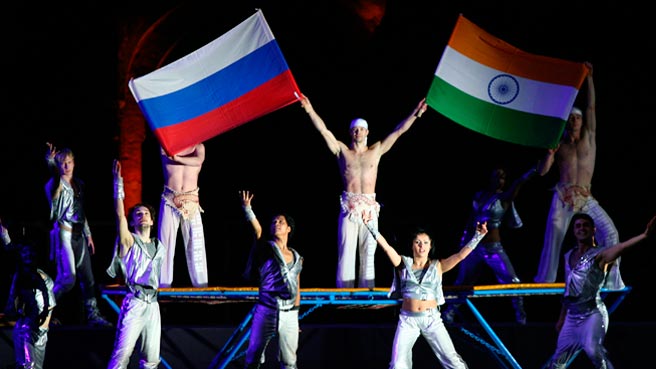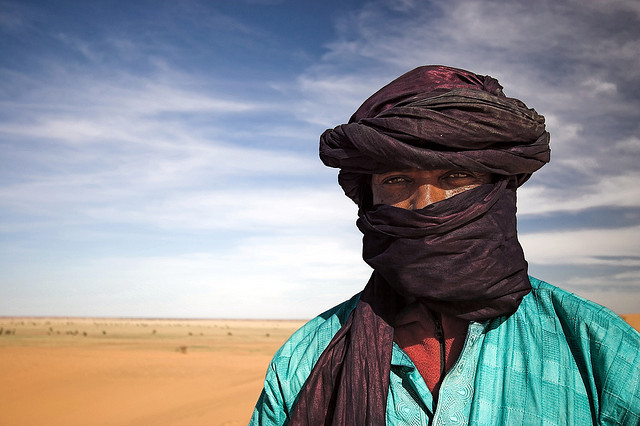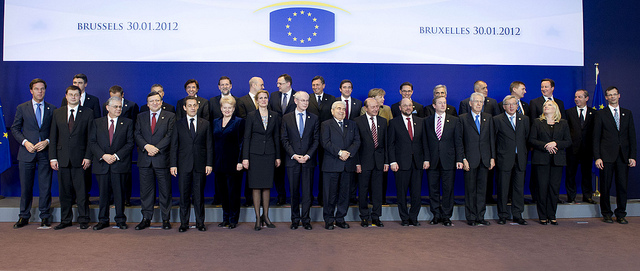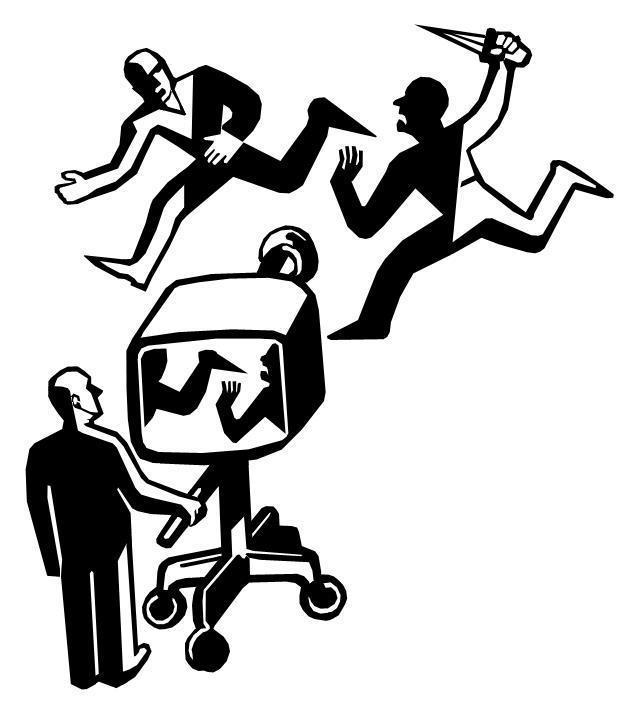Opinion
The Other Side of Ukraine. News from Crimea
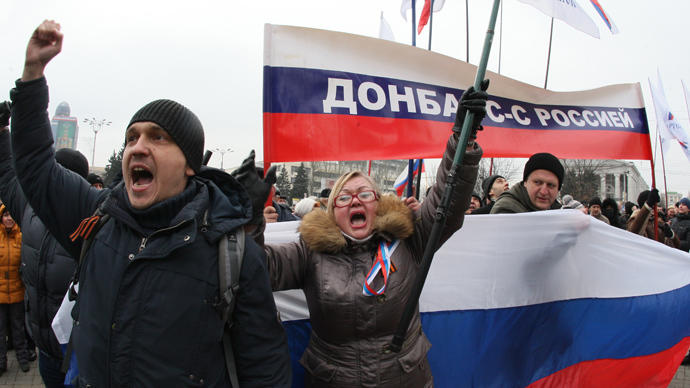
Pro-Russian protesters wave Russian flags and hold a banner reading “Donetsk region is with Russia” during a rally in the industrial Ukrainian city of Donetsk on March 1, 2014 (AFP Photo / Alexander Khudoteply)
Every news has two sides, we at The World Reporter always tried to represent both sides of a news event. We all are seeing what is happening in Ukraine, but I decided to talk with East Ukrainians and people from Crimea and get the story out from the other side of the Ukraine, i.e news from Crimea. Before judging the neutrality of the article, please read other articles on our journal.
I have been covering Ukraine in our news opinion articles since the last week of November. Besides some pro government protests in Donetsk, I have not seen much activity in the east. Western media refused to show anything from East and Russian media was busy calling pro-European leaders evil. I avoided following western as well as Russian news, I only relied on talking to native Ukrainians. I have equal number of close friends from both sides of the country who provided me balanced information whenever I had a question.
Recently, I got a chance to talk to a friend of mine from Yalta (Crimea) and I asked her, if the people in East Ukraine do not support pro EU rallies then why do not they come out to protest and raise their voice in equally strong manner and give Yanukovich some moral support? Her quick answer made me think for a while. “If we will also come out on the streets then who will work in Ukraine?” Her words suggested that East Ukrainians are caring for Ukraine and working for its economy and peace.
Ukrainians taking refuge in Russia
Since the fall of Ukraine’s previous government, I have been thinking, is it democratic? Viktor Yanukovich was the elected president with the majority (more than 50%) to form the government. Considering the high profile pro EU wave, it is possible that probably 60% Ukrainians wanted EU association, but 40% did not want. See more accurate numbers here.
In US, India or any other democratic country it does not matter which party comes to the power, people remain in the country, they do not leave their hopes and most importantly, they do not feel threatened.
In Ukraine, it is not the case. Probably majority of the people did achieve what they wanted and what they felt was good for their country’s future. However, the remaining either have lost their hopes, are fleeing to Russia or are protesting on the streets. Again, do not think that pro Russians are a small community. Ukraine has almost equal division of pro Russians and pro Europeans.
It has been estimated by Russia’s Federal Border Guard Service that 675,000 Ukrainians (most of them from the region bordering Russia and south Ukraine) arrived in Russia in the month of January and February, fearing the “revolutionary chaos” brewing in Ukraine (The fact promoted by Russia Today is debatable)
“In just past two months (January-February), 675,000 Ukrainian citizens have entered Russian territory,” Itar-Tass news agency cited the service as saying.
People in thousands of number in eastern regions and cities such as Kharkov and Donetsk came out on the streets protesting with placard saying, “in Russia we have brothers, in Europe we are slaves!”
Russian loses official language status
As soon as the new government took the charge of Kiev, the first controversial decision (controversial even in the eyes of west and EU) was taken by making Ukrainian the only official language of the country. This prevents Russian to be used by Eastern regions of Ukraine and Hungarian and Romanian language in Western Ukraine. Many consider this move as offensive and threatening, and some of them are losing hopes of continuing their life in Ukraine.
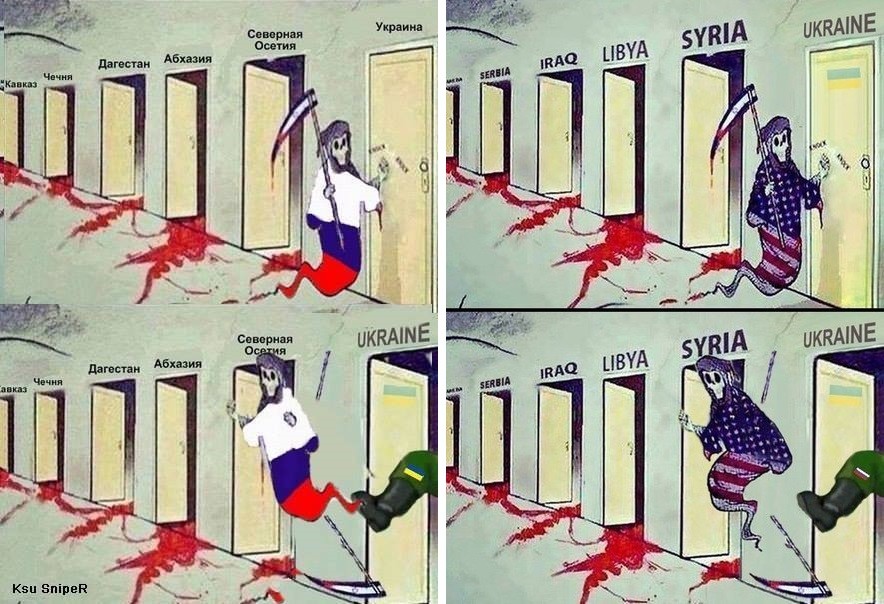
Which is Correct?
[polldaddy poll=7845902]
Crimea turned to Russia for security and financial help
Crimea has declared that it will stay out of Kiev’s business and Kiev should do the same. Speaker of the parliament of Crimea, Vladimir Konstantinov told Kiev to put its own house in order first before commenting anything on Crimea, adding that local authorities can take care of local business in Crimea.
“You in Kiev sort it out between yourselves, and we will deal with the republic’s problems,” Vladimir Konstantinov told in a news conference.
To ensure law and order situation and getting financial aid, the republic of Crimea turned to Russia instead of Kiev. Russia, which already has a military base in Crimea, is said to have been providing security.
“We turned to Russia for help in ensuring law and order, and providing financial aid in this difficult period. This request was granted. Now a working group in Moscow is talking about the technical details of this issue,” Konstantinov said. (Quest for Crimea, Why it is so important for Russia?)
Referendum in Crimea and Donetsk
With the aim of achieving greater autonomy, Parliament in Crimea has scheduled referendum on March 30 on whether it should have greater autonomy and weaker control of Kiev. It is believed that majority will be in favour of greater autonomy for Crimea.
Donetsk has also taken the same step and The City Council has refused to recognize the new government in Ukraine. The City Council has called for a referendum on region’s status and has made Russian official language of the region alongside Ukrainian.
The Council has urged the local parliament to set the date for referendum immediately. The move is set to “protect the citizens from possible violent actions on the behalf of radicalized nationalistic forces,” the council said in a statement.
Ukrainian military surrenders to Crimea
Meanwhile, Crimea’s deputy prime minister, Rustam Temirgaliev, announced that after surrendering their all-military capabilities, no active unit of Ukrainian army remains in the republic.
“The entire Ukrainian armed forces stationed on the Crimean territory have been blocked – a number have been disarmed, while another big portion is switching to the Crimean side,” Interfax reported him as saying.
On Friday, the Navy command of Ukraine resigned as well. Rear admiral Denis Berezovsky took the control of Crimea’s newly formed Navy. The move followed Ukraine’s biggest loss of its flagship, the Hetman Sahaidachny frigate. The frigate refused to follow orders from Kiev and is returning home with a Russian naval flag after taking part in NATO operation in the Gulf of Aden.
After Navy, Air Force has also shown its commitment to the people of Crimea, The Ukrainian Air Force 240th tactical aviation brigade based near Sevastopol has pledged its commitment to the authorities of Crimea. The base is manned by more than 800 troops and has four operational MIG 29 fighters out of 45 fighters, which it is hosting. With Air Force coming in, strength of Crimean military has reached 6,000 personnel.
The head of the Security Service of Crimea Petyor Zima, Chief of Department of Internal Affairs in the Crimea Sergey Abisov, the head of Service for Emergency Situations Sergei Shakhov and present Chief of the Border Guards of Crimea Victor Melnichenko took an oath of commitment to the people of Crimea. They promised “to respect and strictly observe the Constitution of the Autonomous Republic of Crimea” and to “promote the preservation of interethnic accord and civil peace” on the peninsula.
US and Western agencies gathering intelligence.
Activists and pro maidan protesters have been reported of searching residences of former government’s officials to collect intelligence and handing it over to US and German military. However, Germany has curbed their activities.
Federal Security Bureau (FSB) of Russia has detained a Russian citizen coming back from Ukraine, suspected of raiding houses of former officials with other Right Wing group in Kiev.
“They load buses with the self-defence troops and go to MPs’ dachas in the suburbs, to their apartments, and break down their doors. It is not looting, like in taking furniture and stuff. They take documents and hand them over to special people, who check them,” he said in an interview with the Russia-24 news channel.
“It was in the afternoon of February 26, when an American group came in two Mercedes cars. American troops came out wearing their uniforms,” he recalled.
Russia to provide citizenship to willing Ukrainians
Liberal Democratic Party of Russia has introduced a bill allowing simplified citizenship procedure for Ukrainians of Russian origin. Later as the suggestion started coming up, politicians pitched for giving jobs to former members of Ukrainian Berkut police in Russian defence and police forces. Berkut was the semi-autonomous police loyal to Yanukovich government. Each region had its own Berkut unit and were specialised in crowd control. However, they were blamed of kidnapping and killing many maidan protesters and terrorized non-Yanukovich voters in the past elections.
Ukraine to criminalize dual citizenship
In a bill which is still in the parliament can jail people having dual citizenship for up to 10 years. Those who are holding two citizenships would be fined $165 and their citizenship will be declared illegal. Those who are voting in Ukrainian elections with illegal Ukrainian citizenship will face the jail for three years, and those holding public office with illegal citizenship will be jailed for 10 years. if it becomes a law, then it will discourage eastern and southern Ukrainians from taking Russian citizenship, and will encourage others to strip their Russian citizenship.
Last Words
This was an attempt to dig out news from East Ukraine without imposing the views and beliefs of the west. It does not mean that The World Reporter has taken a side. We have been covering Ukraine for months and our previous neutral reports including a survey (also published on KyivPost) can be read here (also in Russian language)
Your Turn
Do you have something to add in the article? Alternatively, do you oppose anything said on this article? Please add your views and opinion in the comments section below and facilitate a healthy intellectual debate. The article may be amended based on selected comments to maintain neutrality. Tweet this article with #антимайдан or #євромайдан.
China
Nepal Hindu Rashtra: Time to Wrap Up Communism?

Nepal abolished the Constitutional Monarchy in May 2008 and declared itself as a Federal Democratic Republic. There was a new hope in Nepal as it was becoming world’s newest democracy even though it had dissolved the Hindu Rashtra. However, the democracy in Nepal immediately got into the tight grips of leftists and communists backed by China. It has been almost 12 years since monarchy was abolished in Nepal. Interestingly, the Himalayan country has already seen 11 Prime Ministers in this period. Thus, leaving the Nepalese people still yearning for good and stable governance.
Re-establish Hindu Rashtra
As the political instability is growing in Nepal, people are demonstrating concerns about the future of the country. In fact, Nepalese citizens are unhappy with frequent interference by China and India influencing its unstable communist regime. More voices are now growing in support of reinstating the Monarchy and declaring Nepal as world’s only Hindu Rashtra (which by default offers full religious freedom to other religious minorities as per Hindutva concept of Sarva Dharma Sama Bhava – all paths lead to one).
Former Deputy Prime Minister of Nepal, Kamal Thapa said that if political parties do not recognize the seriousness of reinstating the monarchy, then the country will head for a period of darkness. “Recently, we’ve had high-ranking officials from India and China come to Nepal to try and solve problems within the ruling party,” he said. “We cannot let others dictate what we want to do.”
Communist Party All Set to Suppress Protests, By Force
Kamal Thapa has firmly demanded an all party meet to discuss reinstating of monarchy. Throughout the month of December, 2020 Nepal has seen anti communism protests across the country in support of reinstating the monarchy and Hindu Rashtra. Most importantly, the demand has become a nationwide mass people’s movement. So much so that the communist regime had to send a directive to 77 districts in 7 provinces. The directive suggests suppressing the protests by force. Nevertheless, Rashtriya Prajatantra Party and other royalist groups have ignored this threat from the communist regime. Protester groups have pledged to strengthen the protest in the coming weeks.
Nepal: Demonstration held in capital Kathmandu, demanding restoration of monarchy in the country. pic.twitter.com/TFjmKu9U9Z
— ANI (@ANI) December 5, 2020
Role of China – Hope for Communism in Nepal
China’s ambassador to Nepal is known to have very close relationship with Nepalese Communist regime. In fact, She has been super effective in tilting Nepal’s posture towards its ideological partner, China. One of her greatest achievements in 2020 was artificially manufacturing a border conflict between Nepal and India. Consequently, souring relations between the two Hindu majority nations. In addition, she managed to silence Nepal’s communist government after China took one of Nepal’s border villages under its control. However, recent political turmoil in Nepal and a renewed demand for reinstating of Hindu Monarchy is showing that the situation is now out of Chinese hands
Role of India
Year 2020, was not a good year for India and Nepal relations. India was busy in controlling domestic Covid cases. On the other hand, China had launched an invasive campaign into Indian territory. In addition, India is always busy with Pakistan on its western borders. However, the surprise came to India when China was almost successful in creating a new border tension between India and Nepal.
Those who do not know about Indian government should note that the current ruling party in India finds itself ideologically opposite to communism. This further creates differences between the two countries.
Communist party in Nepal has blamed India for supporting the ongoing anti communism protests in Nepal. However, former advisor to Nepal’s PM has suggested there is no proof that India is fueling pro Monarchy, anti communism demand in Nepal.
Nevertheless, There are certain influencers in India who have, in their personal capacity, expressed support for reinstating the Hindu monarchy. Yogi Adityanath, who is the Chief Minister of an Indian state bordering Nepal, said in 2015 that Nepal should declare itself a Hindu Monarchy. Readers should note that in 2015 Yogi Adityanath was not the Chief Minister yet. However, today he is not only popular in south of Nepal, his popularity is growing in Nepal as well.
Will The World See the first Hindu Rashtra?
It is difficult to answer this question at this moment. However, Nepalese communist government could not resolve the political instability and in December 2020 Nepalese government dissolved the parliament. Nepal will see next elections in April – May 2021. Hopefully, the world will see Nepal’s 12th Prime Minister in 13 years or may be a Hindu King? Royalists and protester groups have expressed confidence in winning next elections. We have our eyes on Nepal for updates.
Opinion
America’s Justice System – The Need For Reform
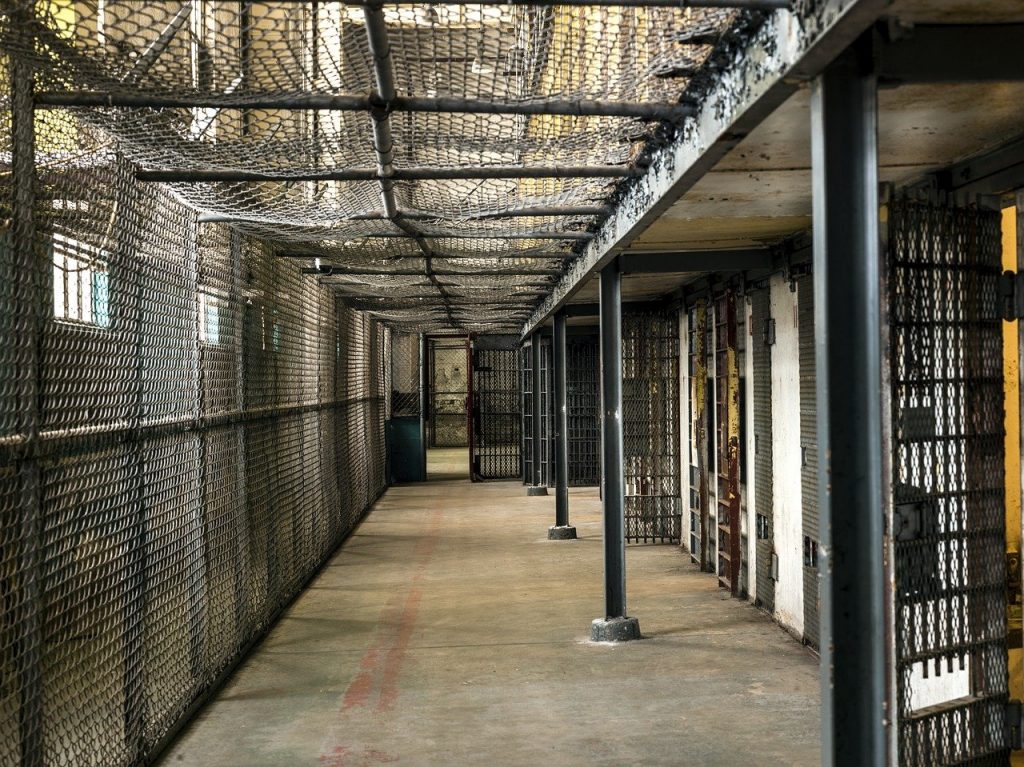
A recent poll by the National Opinion Research Centre revealed that 95% of Americans favour vital criminal justice reforms. This is hardly surprising, given that several people of varying racial, partisan and ideological dispositions have called out the justice system over its many failures throughout the years. Most Americans received the Trump Administration’s First Step Act as a step in the right direction, as about 60% of people approved the criminal justice reform bill according to a 2018 poll. However, many people still believe the justice system’s approach to crime is ineffective and needs dire change, and these are some reasons why.
Prison population and funding concerns
Research conducted revealed America has about 2.3 million prisoners, making the US the country with the highest incarceration rate globally. Experts estimate that the country’s prison population has grown by a whopping 340% over the past three decades; new prisoner admissions into jails are higher than prisoner release numbers. The cost of maintaining the nation’s prisons at taxpayers’ expense has inspired a lot of backlash and calls for budget cuts. According to research, slashed correction spending was the preferred option by most states to balance their budgets and redirect spending to other areas.
Minimum mandatory sentences
Minimum mandatory sentences are statutes that force judges to give defendants convicted of a crime the minimum prison sentence. Mandatory sentences rob judges of the traditional way of considering the defendant’s character and the unique circumstances surrounding offences. Even when represented by criminal defense attorneys with many years’ experience, defendants often succumb to prosecutors’ pressure to plead guilty or face more severe charges with higher mandatory sentences. The guilty plea bargain consequently resolves about 95% of both federal and state court cases. Research also shows that about half of inmates in federal prisons are doing time for drug offences- causing overpopulation in the prison system.
Growing number of people killed by the police
An estimated 1000 civilians are killed by police officers annually in the US. The frequency of police brutality cases over the years requires immediate reform to the American justice system. Data suggests that the incidence of fatal police shootings is higher among African-Americans than any other ethnicity, inspiring movements like the ‘Black Lives Matter’ campaign to press on with protests for significant police etiquette reforms towards coloured minorities. The police force faces incessant accusations of racial profiling, indiscriminate use of power, and poor discretion, which has led a reported 58% of Americans to think policing needs major reforms through measures like better-trained officers, and wearing body cameras.
Evolving public opinion on crime
Research released by the Sentencing Project and The Justice Policy Institute reveals that more people in conservative states are embracing preventive, rehabilitative, and alternative sentencing options for non-violent offenders. Most Americans now view the prevention of crime as the most vital function of the justice system, as 77% of Americans think that focusing more on character education and after-school programs would be cost-effective by reducing the number of people going to jail. Almost two-thirds of Americans also believe in the need for lighter sentences with more useful, reformative programs in prisons that will benefit inmates upon release. Therefore, support for harsh penalties that harden criminals and make them a more significant menace when reintroduced into society has dwindled.
Opinion
The History Question: Is It Better to Remember or to Forget?
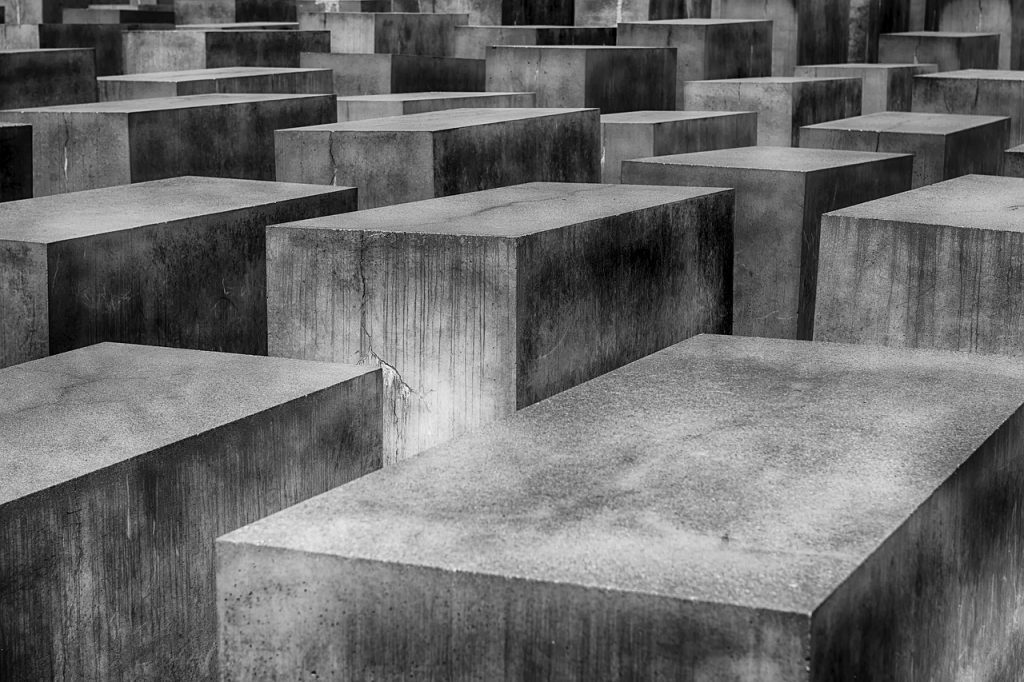
Years ago, a philosopher by the name of George Santayana said a phrase that fuels many debates to this day. His original saying is “those who cannot remember the past are condemned to repeat it”, although, many sources now present it as variations of “those who cannot learn from history are doomed to repeat it”. The latter definitely has more substance to it in the light of the ongoing debate about how much history we should be learning and how.
Is It Better to Remember or Forget About the Past?
On one hand, Santayana was right. Learning about the past is essential in order for people to progress. One also shouldn’t overlook the importance of remembrance and paying respects to the dead, both those who pushed the progress forward and those who have fallen victims to major tragedies that could and should have been averted.
The main argument in favor of learning about the past is that its knowledge is necessary for preventing the same thing happening in the future. Having it one can see the signs and stop the tragedy before it gains momentum.
That’s sound in theory, but the reality is always different. For example, today people are surely forgetting, and the much-critiqued education system is only partially at fault here. Even the greatest of tragedies weren’t spared this fate. It’s a proven fact that about two-thirds of millennials today don’t know about the Holocaust, and this number is surely greater for generations that follow them. In the school history course, the subject of one of the greatest disasters in history is barely touched, if touched at all. And outside of a history classroom, one can only see small, but terrifying, glimpses of it at the Holocaust Museum and other museums that rarely attract many visitors. And now we are witnessing a rise of antisemitic crime.
Are these two facts related? Does the lack of awareness about the horrors done in the name of Aryan supremacy contribute to the fact that right-winged extremists seem to be gaining popularity again?
It does, but by how much? That is the question that no one can truly answer.
And what about other genocides? The Holocaust had the highest death toll, but it was far from the only genocide in history. And quite a few of those happened after World War 2 and before the memory of the atrocities against the Jews began to fade. This means that while forgetting history is a factor, it’s not the deciding factor in its repeats.
But what is that thing responsible for the reenactment of past mistakes and tragedies?
Learning. This is the important thing that is most often overlooked when citing Santayana’s famous saying. It’s not enough to learn about the past and know the facts of things that happened. It’s important to learn from those facts and put in place protections that will prevent them from happening again. And this is something that humanity, as a whole, has yet to succeed in doing.
Dwelling in the Past Can Be Just As Bad
One also shouldn’t forget that there is such a thing as “too much history”. The Bosnian War and genocide that happened there in the 1990s is a vivid example of how the past can be exploited by political powers. Used as a part of propaganda, which fueled the war, history can become a weapon in the hands of those who want to use it for their own goals.
And this is what humans have been doing since the dawn of time. There is always someone who will use any means necessary to achieve whatever it is they wish. This results in wars and genocides, and hundreds of smaller but no less devastating tragedies.
Therefore, the problem isn’t whether people should be learning history but human nature itself. Perhaps, teaching this can help fix this fundamental flaw and truly stop the worst of the past from repeating.


